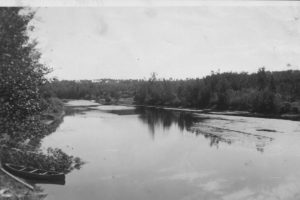Author Archive: Jennifer Strassel
Riel Gentlemen’s Choir Food Bank Donation
On December 4th The Listening Room presented the Riel Gentlemen's Choir.
The Lac du Bonnet & District Historical Society is grateful for your support in attending and on December 20 presented $420.00 to our local Food Bank.
Janice Halliday is seen handing over the cheque to Russ & Linda Reid representatives of the Lac du Bonnet & Area Food Bank
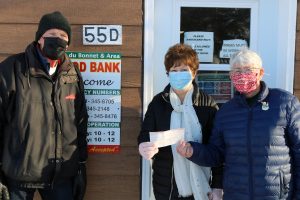
Newsletter 2021
Riel Gentleman’s Choir December 4, 2021
First RM Council
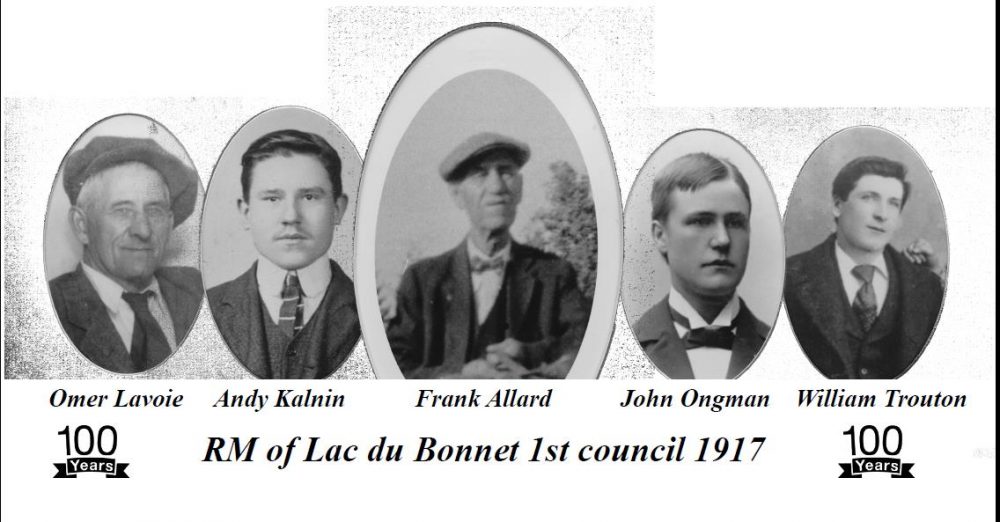
The first meeting of the Rural Municipality council was held in the Lac du Bonnet School House.
Some interesting items from their notes include:
- By-Law 3 - borrow $3,000 to carry on business.
- By-Law 4 - restraining the running-at-large of bulls over six months and colts over nine months of age.
- Motion passed that Andy Kalnin be authorized to inspect and locate a road between the Winnipeg River and Lee River.
- Motion to write the CPR to make arrangements for a crossing and dockage site at the foot of Third Street.
- John Duncan McArthur pays Lac du Bonnet’s first municipal taxes for the brick plant and sawmill to the sum of $709.67.
- Purchase the building and land on Lot # 20 Block # 2 in the Village of Lac du Bonnet for $600 to be used as the Municipal Hall. (Third Street).
Brian Kabaluk : A Great Place to Grow Up
Written by Brian Kabaluk
The Kabaluk families settled in Landerville around 1910. Most of the early settlers in the Lac du Bonnet area found it difficult to earn a living farming and there was very little other work available so their income had to be supplemented by cutting pulp wood. My dad, Nick Kabaluk and his brother Alex kept a record of their income from cutting pulp wood from 1935 to 1940. In 1935 my dad was 20 years old while his brother Alex was only 15. That year they cut 117 cords at $1.25 a cord earning $146.25 for the entire winter. The wood had to be cut by hand, into 4' lengths and hauled out with a team of horses and sled to the nearest railroad then loaded on the rail cars. Due to the lack of roads where they cut the wood, the work could only be done in winter when the horses were able to pull a sled.
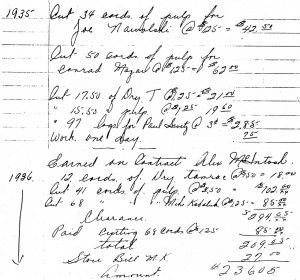
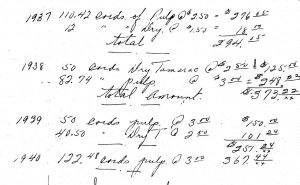
As difficult as the wood cutting was with poor tools and clothing in such extreme weather conditions, maintaining a farm was equally as difficult because everything had to be done by hand. One example of such work is a building that is still standing on our old farm on the corner of Hanson Road and #11 highway. This building was built in Landerville by my dad and his brother Alex as a pig barn over 80 years ago. All the logs were squared with an ax and the dovetailed corners cut with a hand saw. With the primitive tools that they had, the craftsmanship was quite remarkable. The corner joints are almost as tight today as they were when it was build. In 1945 my dad hauled that barn from Landerville on skids with a tractor to our new farm two miles south of Lac du Bonnet.
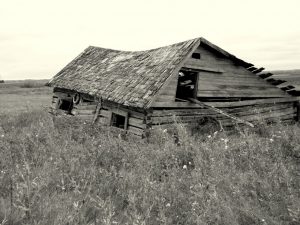
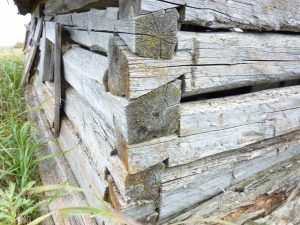
There were two Kabaluk families who originally settled in Landerville. My grandfather Stanley Kabaluk and his brother John. Stanley had three sons Micheal, Alex and my dad Nick.
John had four sons and one daughter, they were Bill, Mike, Pete, Dan and Kate. Kate owned the Wal-Bec theater. Her former husband was Walter Becta.
My grandfather also had a sister Mary who was married to Andrew Olynick. They also lived in Landerville and had a large family, John, Mike, Ann (Haladki/Bracnick), Katie (Mazur), Dora (Lesko/Giffth), Nellie (Gurniak/?) Peter, Josie (Kohanoski), and Mary (Haladki). Through this family I'm related to half of Lac du Bonnet.
My grandfather also had another brother, John, who lived in Brokenhead. The reason that there were two Johns in that family was because that was the way their two different Ukrainian names were translated into English when they immigrated to Canada.
The Kabaluk who owned the store by the school was Bill. When he sold that store he bought a chip stand/pool room next to Casey's Inn. I believe that his brother Mike also owned a store in Landerville for a while. Gordon Kabaluk might know. His dad was Pete.

In 1950, we moved into a house next to Central Northern Airlines just above the town dock. Lac du Bonnet was vibrant and alive with people everywhere, especially on weekends when all the farming communities would converge on the town to shop and socialize. Part of the ambiance of the town was the sound of gospel music on the sidewalks and the smell of french fries and vinegar, while crowds gathered around the two chips stands and construction workers, miners and rice pickers packed the two beer parlors.
I'm thankful to have had the privilege of growing up in a very unique environment at such an exciting time and fortunate for not having television, video games or cell phones because we used our imaginations. Most of the the toys and games that we had, we made ourselves. One day we could be pirates with a stick for a sword, while the next day that same stick could be a gun.
One game that we often played was “knock out ginger”, where we would knock on a door, then just before the occupant would open it we would run like hell. Some people would actually chase us, but little did they know that if they just ignored us we wouldn't knock on their door again.
On Halloween we took trick or treating to another level by tipping over outdoor toilets. One individual was targeted more than others because he would put rotten fruit and vegetables from his store in our bags. We waited patently in the lane until he came out to use his toilet. Once comfortably inside and resting on his throne, we tipped the toilet over onto the door, trapping him inside. I'm sure that many people breathed a huge collective sigh of relief when the town announced the new sewage system and the end of outdoor toilets.
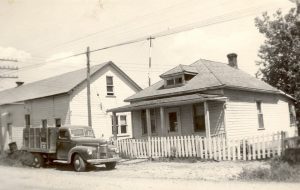 After our house was remodeled with our bedroom facing the street, my brother and I had a front row seat of live fights out of our bedroom window as the bar room brawls tumbled out into the street from the beer parlor of the Lakeview Hotel.
After our house was remodeled with our bedroom facing the street, my brother and I had a front row seat of live fights out of our bedroom window as the bar room brawls tumbled out into the street from the beer parlor of the Lakeview Hotel.
The town dock at our back door was the center of activity, winter and summer, with tobogganing, skating, fishing and swimming as well as numerous other sports around town. There was never a shortage of activities. I don't ever remember any kids whining about being bored. “Bored” was simply not in our vocabulary. We could walk for miles in either direction along the river from Pickerel Rock to Holiday Beach. Even with the school just across the street, at times it was just too tempting to skip classes and go fishing.
Growing up in LDB wasn't all play. Many of us had newspaper routes where we lugged huge bags of papers around town every evening. One of the most memorable jobs was working for one of our teachers, Mr. Zaborniak. While he drove a tractor and stone bolt on his farm in Brightstone, we picked rocks in pails. At the end of a back breaking day we got paid a penny a pail.
Our living room window looked right into the CNA and later Trans Air office where many of the legendary bush pilots partied and played cards long into the night. But the planes were always flying at daybreak, transporting passengers, freight and mail to outposts throughout northern Manitoba, Ontario and the NWT. Unfortunately some never returned. In the early fifties many adults were still in awe of these incredible flying machines, but for a wide eyed kid from the farm they were an unimaginable sight. One day while I was poking around on the dock, George Fournier, the head mechanic, invited me up for a ride in a Norseman. My heart almost thumped out of my chest with excitement. When we leveled off he asked me to hold the stick and not touch anything else. With a wrench in one hand, he opened the door and crawled out onto the wing strut. Hanging on with one arm and one leg he adjusted a cable on the flap while I sat there frozen, unable to move or breath. There were still a few older airplanes flying out of CNA like the Waco, Tiger Moth, Norseman and the largest single engine plane the Bellanca. Within a short time the Beaver arrived. Because of its design and powerful engine it could get off the water quicker, allowing it to get into small lakes that were not accessible with other air crafts. Every time I hear the drone of the unmistakable and unforgettable Pratt & Whitney radial engine of a Beaver flying overhead it takes me back across the country to the banks of the Winnipeg River.
At that time the Community Hall, Lagsdin's Hall, Holiday Beach and Riverland Hall were all booming on weekends with social events, as well as numerous house parties. Today the dance halls are gone and the bars are empty, seemingly replaced by a personal care home, medical clinic, wellness centers physiotherapy clinics. It almost seems like the town has evolved with the generation that I grew up with. The times have changed, as have the demographics of the town, with many new homes and businesses and a quieter laid back lifestyle, it still appears to be a great place to grow up.
Emma Osis : Life on Bird River
Emma Osis Remembers Bird River 1910-192
edited by Chuck Leibert
It was 1910 and the first of the Latvians to settle in Bird River began to arrive. Early Bird River was a thriving community and a gateway to the wilderness as prospectors and trappers alike used it as a stepping off point to the “bush”.
Joseph Drawson, thought to be the first Latvian who settled at Bird River in April 1910, built an odd structure, mostly of galvanized tin nailed to a frame with a room constructed of logs at one end. He must have used it only for the summer. Mr Drawson and his wife had opened a rooming house near the railway station in Winnipeg where they welcomed the Latvian immigrants as they arrived, giving them shelter and advice.
After a filling meal of homemade sausages and a good night’s rest, Joseph Drawson told them of Bird River. About a dozen Latvian families settled the area between 1910 and 1927. My father, Michel Osis came with his wife Anna and four children. He purchased land in Bird River in September 1910 along with the Katlis, Arro and Gulbis families.
Bird River around our area was like having a place in a big park. The fields were all fenced off by barbed wire strung between poplar fence posts which were put in the ground by sharpening one end and pounding them into the ground with a flat rock. Cattle and horses had to graze in the surrounding bush until after haying, which was after the growing season.
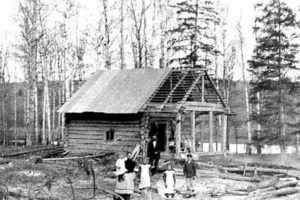
Osis Family in front of first home, 1910
Michel & Anna with Peter, Anna, Milda and Zelma
The Latvians carved their living out of the wilderness with only a few hand tools. Ladders were made of two straight trees with saplings for rungs. Houses were made from logs, shingles were split by hand and floors were mud. Pieces of log were used for chairs and beds were a wooden slab platform topped with mattresses made of canvas bags filled with straw. Quilts and pillows were sewn and filled with feathers.
Mrs. Joseph Drawson was known to be a good midwife. She lived across the river at that time and November 24, 1913 was a cold day. She must have stayed there waiting for me to be born. She was such a wonderful person to leave her business in Winnipeg to come out to help my mother, but the ice was forming fast on the river. The Osis family were slaughtering pigs when Anna went into labor. Michel and brother Peter came quickly across the icy river and with the help of Mrs. Drawson I was born hearty and hale.
Our first home of logs was already built when I was born in 1913. Dad and Peter worked together on everything. My sisters Anna and Milda were not at home very much as they were babysitting for other families and helping them with farm work; and Selma and Ella were attending school. I stayed home to watch my brother August as mother had other chores. We had one cow and calf, two pigs, one horse and the vegetable garden.
During fall freeze-up and the spring ice break-up we were isolated as there was no road passage and no way to get across the river. In emergencies people walked across the river with one foot in the canoe! One of the spring chores was to drain the spring-melted snow water from the bush around the cabins into the river.
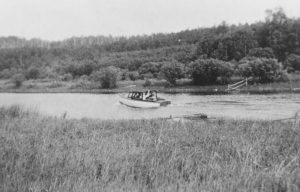
Alec Arro Weekly Summer Mail Delivery
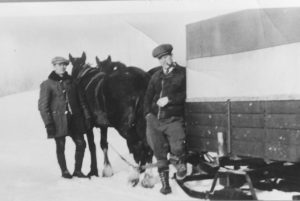
Alec Arro Weekly Winter Mail Delivery
Letters and lists of things needed from Lac Du Bonnet went to our local Post Office on Thursdays. In the summer a boat with a 10hp outboard motor, and in the winter a horse pulling a sleigh would depart Friday morning, drop off the list at the Lac Du Bonnet General Store; go to the Post Office to drop off the mail, pick up goods from the bus depot and rail station, return to pick up the store orders and journey back to Bird River to the crowd.
Everyone was at the Bird River Post Office on Friday afternoons. They came by canoe in the summer, skates in the fall after freeze-up, on foot and sometimes by horse and cutter in winter. It was the highlight of my week. I was allowed one treat and it was always a big decision between candy, a chocolate bar, or a can of Libby's pork and beans.
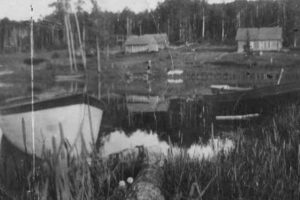
Osis Second Homestead, 1923
Dad and Peter built our second house while I cared for my little brother August and mother did chores. I watched with great interest as they pulled pine logs from the bush with our little horse; peeling the logs so white and smelling so fresh, splitting the shingles and gathering the moss to chink between the logs. I spent time carrying chips and blocks to mother's kitchen. I was not made to do this but wanted to help. August was soon a companion and a little person to me instead of a baby. We worked together, constantly going into the woods, trying to cut logs to build it. We spent many hours on the rock hill behind the barn building of South Road and had a long swim in the river afterward. Once we moved into our new home it made me sad to watch the split logs turn an ugly brown.

Osis Family in front of the Second House. Anna Osis with children Anna, Emma, August, Charlie, Ella, Zelma
I recall the School Principal urging my dad too let me go to school, but dad's answer was" Emma is a help to mother looking after the little ones. I will let her go when August gets bigger." My little brother Charlie soon came along and I was nine years old when dad finally let me go to school.

Bird River before water was raised Post Office in Background
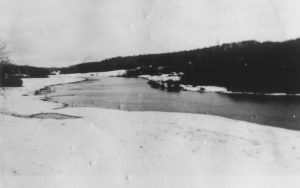
Bird River before water was raised
Emma Osis Meets Charlie Libert 1922-1932
The year was 1922 and I finally started Bird River School. In those days the grades were passed by marks and not by how many years you put in so I studied hard and caught up with the rest of the kids my age. The years went by fast and I was 13 when I passed grade 8 which was the last grade in the country schools. That was as far as I ever went.
I kept dreaming ahead of life, of romance, and meeting the man of my dreams just as any normal teenager does, but I couldn’t see myself with any boy I went to school with. I thought that to meet someone I would have to leave Bird River, find a job, or end up an old maid which frightened me somewhat. I had no idea that my future husband would soon be on his way.
At that time my father subscribed to the Latvian newspaper direct from Europe. Dad and my brother Peter wrote an article and sent it there with snapshots under the headlines, “How Latvians live in Canada”. In it they wrote about the white-skinned trees and panning for gold and staking claims. They showed a photo of a pile of furs and a large bear that had just been shot.
It happened that a young Latvian by the name of Karlas Libert (later nicknamed Charlie) read this article. His father had passed away and left his country store and beer parlour to his sons Karlas and Edward but Karlas decided instead to come to Canada, destination Bird River, Manitoba. Karlas sold his shares to his brother and with that money started his journey. Along the way Charlie met another Latvian, Albert Herman. Together they came straight to Bird River.
It was a beautiful misty morning in June 1927 when I first met Charlie. I and my brothers August and Charlie were getting into a canoe to go to school when in a bend in the river we spotted one of Ledin’s flat bottomed boats with two inexperienced boatmen. We chuckled as they tried to get the boat to go straight, but kept hitting the shore from side to side.
That evening I met the two men. Charlie Libert was eager to join dad and Peter in the bush to learn how to stake claims, collect samples, and trap furs. Albert Herman had no interest for a life in the bush so Dad and Peter got him a job at John Peterson sawmill where he worked for a long time.
Although he could barely speak English it wasn’t long before Charlie was running his own business. He took to picking samples and hired men to stake claims for him. He was all energy and life; so eager to get ahead. Dad liked him so he stayed with us and when he wasn’t in the bush staking claims, he made piles of wood for winter. I liked him too and was especially nice to him, but kept thinking he would not notice me, a girl going on fourteen.
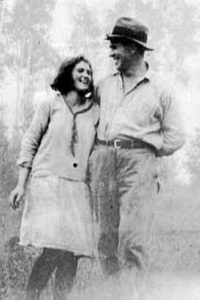
1929 Emma Osis and Charlie Libert before they were married. Emma has just come out of the smokehouse checking the sturgeon.
We were a family that loved music and our evenings were spent singing. August got himself an accordion and John Lapin taught my brother Charlie the violin. I plunked notes on an old piano. I never learned to play but could play tunes by ear. Charlie Libert joined in and we had many wonderful evenings together.
In those years a lot of claim staking was going on. Mining companies were formed and gold or other minerals were in demand. Charlie still struggled with broken English, but had a good head for business and talked companies into paying him to “stake” for them. He always hired a couple of men to help him and made pretty good living that way.
One day in early spring of 1929 my romantic dream came true. I was halfway home from the post office when I saw Charlie Libert walking towards me. I wondered where he was going. He said “I came to meet you and talk to you. You know I love you. I want to marry you and take you to Europe to meet my mother.” It made me so happy to hear this from him!
I would be sixteen in the fall, so we set the date for October 15th to leave for Europe and be at his home for Christmas. Mother thought I was too young but they finally consented and we took a boat with a 10 hp Johnson motor to Lac du Bonnet and we were married, returning to the Osis' residence for the reception.
On October 16, 1929, we left Bird River River and went by train to Halifax. The next day we got on an ocean liner which took us to South Hampton, England in seven days. We spent some time in England and then took a smaller vessel across the English Channel to Antwerp,Belgium and then by train to several European countries. As we travelled around Charlie purchased some new clothes for me. A couple of long gowns to wear to the opera and wool dresses for social events. Life was very different here. Finally the day arrived to meet his mother!
The day finally came and we took a cab from Riga to their home in the country. They had arranged a big reception with relatives, friends and neighbours in their one story stone building with a store at one end and a large beer parlour with living quarters at the other. After a big dinner and welcome speeches, we were presented with a cut glass fruit dish, some silver spoons and a glass sugar bowl.
We visited my mother’s relatives and her birthplace, it was very impressive. One side was a flour mill run by waterpower and on the other side a furniture shop with living quarters at the back. We also visited the little country farm outside of Riga where my father grew up and where my brother Peter and sisters Anna and Milda were born. It was a wonderful experience!
We returned to Bird River in April 1930. Charlie had fallen in love with Canadian bush life and was anxious to get back to claim and stake. We needed a house of our own. As my father owned a large acreage of land across the river (purchased from Joseph Drawson) we picked out a two acre spot as a wedding present. His plan was to leave his own homestead to August and this land to brother Charlie, as Peter had bought the point at Lee River Falls and he and his wife Wilma were planning to open a picnic ground.
Mr. Simon was to be our carpenter. He stayed at the homestead while building our house. He said “I'm hiring a helper” and took my brother August, a boy between ages 12 and 13 and told him “I will show you how to build. I know you will be good at it.” My brother August became a carpenter and built a real house for me.
Charlie Libert got more popular for hiring men to stake claims and pan for gold. He was flown by plane to Flin Flon, Beresford Lake, Island Lake and around San Antonio God Mies (Bisset) on Rice Lake. He also gave a lot of men jobs to go with him to stake claims and cut lines.
After the 1929 stock market crash Charlie bought up stock and made money in the stock market. He bought two lots in Lac du Bonnet where the Laverendry Store stands and the other near Dancyt’s Store.
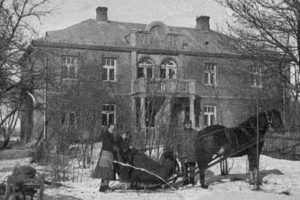
1931 Charlie and Emma’s Home in Latvia.
We were barely a year in our Bird River home when Charlie and I returned to Europe. He wanted to share the news of great prosperity in Canada. At that time we purchased our Latvian home. It was purchased in full and managed for us by a caretaker. In the winter of 1932 I was a fine lady. We entertained a lot and life was grand; but Charlie once again grew restless and we wanted to start a family. He wanted to return to Bird River so our children would be born in Canada.
My father once again gave us two acres of land but we knew we would not be staying long. We still had our home in Latvia and we thought we would travel back and forth. Soon I was busy raising two children while Charlie was up north looking for gold and playing the stock market. Extra money was sent to Latvia to take care of the estate. Little did we know how our lives would turn. In 1937 we spoke of returning to Latvia, but Hitler and Mussolini were causing trouble and war was inevitable. I soon would realize that these plans would not materialize as the estate is confiscated in war and our life changes on the Bird River.
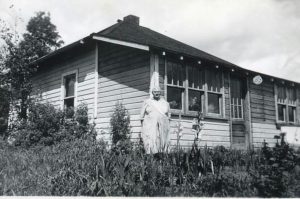
1940 Anna Osis in front of her house with the red roof.
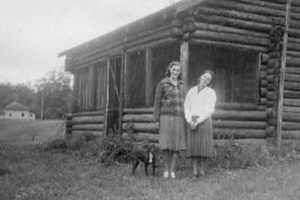
1940 Emma Libert and Lolla Zeemel in front of Libert Home (1932). In the background is the first Libert Home (1929) now occupied by Anna.
Emma and Charlie Libert's Camping Holiday 1932-1944
One day in September 1932 my husband Charlie and I left our home on the river and went on a camping trip by canoe to explore their camps so I had an idea of how Charlie, Peter and my dad lived in the bush. To get to camp 1 at Bird Lake we carried the canoe over two portages. Very small and low without windows or doors, it was a hole big enough to crawl in with a canvas platform to lay on between two logs.
On the ceiling hung little canvas bags to keep mice out of the food inside. Inside one was a loaf of stale bread and other smaller bags held salt, sugar, tea, and coffee. Those things were always stored there. The rest of the food for meals was brought in by pack sack. An open fire stove had been made from two piles of stones with cross sticks so that a pail could hang in- between. We made a fire and that evening our meal was of canned goods and tea from lake water in a blackened syrup pail.
I was not willing to sleep inside, so Charlie made a bed of Spruce boughs and we slept outside on canvas sheets. The next morning we ate a breakfast of coffee, bread, cheese and jam. Charlie later shot a couple of partridges and was very proudly going to make lunch the way dad and Peter had taught him. He cleaned the chickens and kept only the breasts, throwing them in the black pail with a few potatoes. The salt was missing, so to find some we planned to go to Peter’s main camp about a mile away.
Charlie did not want to miss a chance to hunt and fish along the way so he loaded the gun and put in the fishing line as we entered the canoe. When we landed on shore, as I stepped out to control the swaying canoe I heard a shot. I turned around and to my horror I saw Charlie's right arm, white bone below the elbow and blood gushing. He shouted to me to remove my blouse and tie it around his arm to slow the bleeding and then we paddled frantically to where there was a motor boat that could take him to a doctor. He could only use his left arm and I with both of mine with all the strength I could find. Somehow we dragged the canoe across the portages and when we finally arrived it was I, not Charlie, who passed out.
Later Charlie told me that he had cocked the gun and laid it across the middle seat ready to shoot should a duck cross our path. The swaying canoe caused the gun to slide toward him and when he reached for it his fingers caught the tip of the barrel causing the gun to go off. It shot off half of his little finger and the muscle below the right elbow.
Charlie was taken by boat to a doctor in Lac du Bonnet, and I was taken home to clean up. He was then sent to St Boniface hospital in Winnipeg and I hurried to join him in support. Poor Charlie was seven weeks in hospital. When we returned to Bird River I revealed to him that I was expecting our first child, who was conceived during our camping holiday. Charlie needed a lot of rest and we spent all of that winter in our cabin.
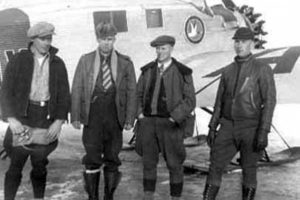
1939 Flying out to stake claims. Albert Zeemel, Unknown, Charlie Libert, August Osis.
In May 1933 Charlie and Albert Zeemel were prospecting at Gods Lake when our son was born. The company’s owner hired an airplane to fly out to deliver the news. The men were swimming in the bay on God's Lake when they landed on the water and called out to them, “Charlie Libert has a boy, 9 lbs. 11 oz!” We named him Clifford after the doctor who treated him while he was in hospital with his arm. A little less than two years later, in March of 1935, our daughter was born.
Life was busy over the next few years with Charlie prospecting and I minding young children. One fine morning in the early days of September 1940 he was preparing to leave again for the bush and I was looking ahead to his return from the last trip of the season. I would miss him. He spoke of a party we would throw to celebrate our wedding anniversary when he returned. But that day would never come.
Later that night I awoke to my sister and a policeman at my door. There had been an accident. Charlie’s canoe had tipped over and he was unable to reach shore. My beloved Charlie had drowned and I would never see him again. I desperately wanted to awaken from the nightmare, to see him again. Even after the funeral I was expecting him to come home out of the bush. It was difficult to go on, but I had to do it for my children’s sake.

1940 Waiting for Dad to come home.
One day I gathered up all of his bush clothes and piled them out in the field. And then I lit them on fire and sobbed while I watched them burn. It was time to let him go.
On our own now, but with my family near by, the children (11 and 9 years of age) continued to attend the same Bird River School as I had years before. We left our cabin along the Bird River in 1944 and moved to Winnipeg to start a new chapter in our lives, but I will always think of those 10 wonderful years I had with Charlie Libert as the best of my life.
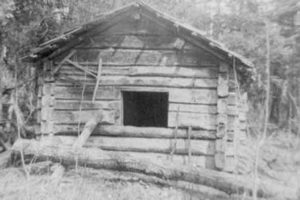
1956 Peter Osis Trapping cabin. These camps were never locked in case anyone was in need of shelter. The Osis camps had only a small door about 2 ft off the ground so you can enter during winter without shovelling snow.
Chuck Leibert brings fresh vegetables to the surrounding cottage community and garlic all over the province from the second homestead property. In 2009 Chuck created Emma’s Garden in honour of Grandma Emma who grew up there. Chuck and Julie sell their vegetables at the Lac du Bonnet Farmers Market and through their email network. Chuck is at cleibert@birdriver.ca
Newsletter 2020
The Lac du Bonnet Train Station
Written by Marcel R Pitre

The CPR Train Station in Lac du Bonnet was not unlike any other train station in Manitoba, or indeed Canada. All stations were generally the same colour, a deep unmistakable dark wine. They were the crucial, centrally located and chief facility in towns and villages as they grew in size and importance. Stations were the hub of activity, a place where people assembled when arriving or leaving. All mail and supplies left and return that way, and in some cases, I’ve heard even individual liquor purchases were delivered by train, those were the days when roads and cars were in short supply. There were many very vital, very important functions carried on in the area that used the services of the Lac du Bonnet CPR Station.
The Lac du Bonnet CPR Steam Train Water Tower
Written by Marcel R Pitre 
In the early “steam-engines-train-years” huge water tanks accompanied and partnered with train tracks to quench and dispel a passing “steam-engines-driven-train” of its thirst as it makes its way across our country. And so it was that the CPR positioned their water facility... just a part of a kilometer past Lac du Bonnet on the way to Great Falls.
